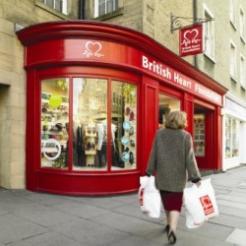The British Heart Foundation’s attack on commercial charity collections yesterday has prompted some concern that public confidence in house-to-house collections could be undermined at a time when charities are desperate for cash.
The charity attracted wide media attention yesterday with a piece of research which showed that the majority of house-to-house collections are run by commercial operators on behalf of charities and called on these operators to be more upfront about what proceeds go to charity. The release preceded BHF’s launch today of a month-long stock donation campaign to its own charity shops.
The research predictably drew the ire of the Textile Recycling Association, which in turn called on the BHF to be more upfront about the costs involved in running shops. Alan Wheeler, national liaison officer for the TRA, told CivilSociety.co.uk yesterday, “They have failed to be transparent and to declare that about 85 per cent of all their income from their retail activities is ploughed back into running costs.
"We would like to see all charities that hide their costs, brought into line with the rest of the industry by declaring their costs, so that the public are able to make a fair and informed choice about which charity collections they wish to support.”
Charities too have defended the use of commercial collectors. Paul Amadi, director of the NSPCC, said that the charity’s relationship with Clothes Aid has raised £1.7m since 2009. “As is the case for the vast majority of charities, NSPCC doesn’t have a string of shops so this a significant amount of income which would otherwise been denied to us. What appeals about our relationship with our commercial collector is that all of the costs are absorbed by them, meaning that the NSPCC can invest further sums into our work,” he said.
“Particularly during these economically uncertain times, the sector needs to be doing all it can to encourage giving and avoid the risk of creating cynicism about fundraising which is a real possibility.”
The Institute of Fundraising reiterated its stance that all forms of fundraising involve costs. Simon Morrison, director of marketing at communications at the Institute, said, “different models work well with different charities.”
Morrison said that the release of the BHF research and call for people to donate to shops, rather than via collections, was “certainly not ideal”.
“It doesn’t help public perception,” he said but added that the Institute would never dictate what charities should or should not say to the public. Asked whether this kind of public statement by charities could confuse the government-led work on reducing bogus and stolen collections he said “Government is informed enough to make the distinction between bogus and commercial collections.”
The Institute will not be reprimanding the BHF over its public statements rather Morrison said that the organisation is always in “ongoing discussions with its members”.
A spokeswoman for the BHF said that the research and public comments had not attracted any angry calls from other charities. “We’ve not had any negative or difficult conversations with other charities,” she said.
She said that the release was simply to highlight a practice which the general public largely do not know about. “We really don’t want people to be misled when they donate,” she said.
“Everyone is so shocked when they learn that their donations get sold overseas. They thought it ended up at their local shop.
“We completely get that this is a vital source of revenue for some charities, but the lack of public understanding is appalling.”
BHF shop expansion and stock donation campaign
The BHF is the second-biggest charity shop retailer in the UK, with more than 670 shops. This is an increase on the 642 shops at the end of last financial year, according to the Charity Shops Survey 2010, and a spokeswoman said this was largely due to the expansion of the charity’s furniture and electrical stores. Last year the charity raised £22.2m in profit from the stores, a 41 per cent increase on 2009. The charity maintains that donations of stock over the past two years has decreased by more than a third.
The BHF today launch a month-long campaign to get people donating to its stores. The spokeswoman for the charity said that the charity is hoping to attract 600,000 bags of stock donations, which would raise around £12m.









